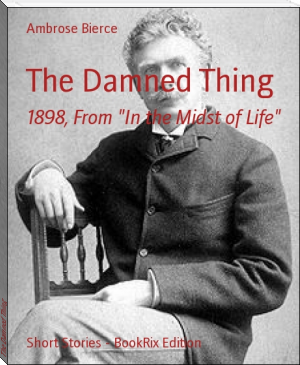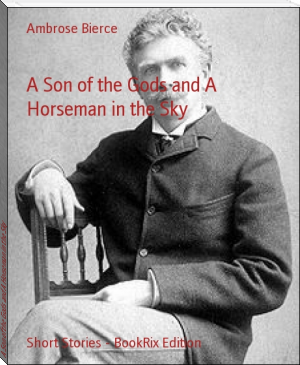Can Such Things Be? by Ambrose Bierce (popular books of all time .TXT) 📖

- Author: Ambrose Bierce
Book online «Can Such Things Be? by Ambrose Bierce (popular books of all time .TXT) 📖». Author Ambrose Bierce
Three days later I recovered consciousness in a hospital. As the memory of that tragic night slowly evolved in my ailing brain recognized in my attendant Moxon's confidential workman, Haley. Responding to a look he approached, smiling.
"Tell me about it," I managed to say, faintly--"all about it."
"Certainly," he said; "you were carried unconscious from a burning house--Moxon's. Nobody knows how you came to be there. You may have to do a little explaining. The origin of the fire is a bit mysterious, too. My own notion is that the house was struck by lightning."
"And Moxon?"
"Buried yesterday--what was left of him."
Apparently this reticent person could unfold himself on occasion. When imparting shocking intelligence to the sick he was affable enough. After some moments of the keenest mental suffering I ventured to ask another question:
"Who rescued me?"
"Well, if that interests you--I did."
"Thank you, Mr. Haley, and may God bless you for it. Did you rescue, also, that charming product of your skill, the automaton chess-player that murdered its inventor?"
The man was silent a long time, looking away from me. Presently he turned and gravely said:
"Do you know that?"
"I do," I replied; "I saw it done."
That was many years ago. If asked to-day I should answer less confidently.
A TOUGH TUSSLE
One night in the autumn of 1861 a man sat alone in the heart of a forest in western Virginia. The region was one of the wildest on the continent--the Cheat Mountain country. There was no lack of people close at hand, however; within a mile of where the man sat was the now silent camp of a whole Federal brigade. Somewhere about--it might be still nearer--was a force of the enemy, the numbers unknown. It was this uncertainty as to its numbers and position that accounted for the man's presence in that lonely spot; he was a young officer of a Federal infantry regiment and his business there was to guard his sleeping comrades in the camp against a surprise. He was in command of a detachment of men constituting a picket-guard. These men he had stationed just at nightfall in an irregular line, determined by the nature of the ground, several hundred yards in front of where he now sat. The line ran through the forest, among the rocks and laurel thickets, the men fifteen or twenty paces apart, all in concealment and under injunction of strict silence and unremitting vigilance. In four hours, if nothing occurred, they would be relieved by a fresh detachment from the reserve now resting in care of its captain some distance away to the left and rear. Before stationing his men the young officer of whom we are writing had pointed out to his two sergeants the spot at which he would be found if it should be necessary to consult him, or if his presence at the front line should be required.
It was a quiet enough spot--the fork of an old wood-road, on the two branches of which, prolonging themselves deviously forward in the dim moonlight, the sergeants were themselves stationed, a few paces in rear of the line. If driven sharply back by a sudden onset of the enemy--and pickets are not expected to make a stand after firing--the men would come into the converging roads and naturally following them to their point of intersection could be rallied and "formed." In his small way the author of these dispositions was something of a strategist; if Napoleon had planned as intelligently at Waterloo he would have won that memorable battle and been overthrown later.
Second-Lieutenant Brainerd Byring was a brave and efficient officer, young and comparatively inexperienced as he was in the business of killing his fellow-men. He had enlisted in the very first days of the war as a private, with no military knowledge whatever, had been made first-sergeant of his company on account of his education and engaging manner, and had been lucky enough to lose his captain by a Confederate bullet; in the resulting promotions he had gained a commission. He had been in several engagements, such as they were-- at Philippi, Rich Mountain, Carrick's Ford and Greenbrier--and had borne himself with such gallantry as not to attract the attention of his superior officers. The exhilaration of battle was agreeable to him, but the sight of the dead, with their clay faces, blank eyes and stiff bodies, which when not unnaturally shrunken were unnaturally swollen, had always intolerably affected him. He felt toward them a kind of reasonless antipathy that was something more than the physical and spiritual repugnance common to us all. Doubtless this feeling was due to his unusually acute sensibilities--his keen sense of the beautiful, which these hideous things outraged. Whatever may have been the cause, he could not look upon a dead body without a loathing which had in it an element of resentment. What others have respected as the dignity of death had to him no existence--was altogether unthinkable. Death was a thing to be hated. It was not picturesque, it had no tender and solemn side--a dismal thing, hideous in all its manifestations and suggestions. Lieutenant Byring was a braver man than anybody knew, for nobody knew his horror of that which he was ever ready to incur.
Having posted his men, instructed his sergeants and retired to his station, he seated himself on a log, and with senses all alert began his vigil. For greater ease he loosened his sword-belt and taking his heavy revolver from his holster laid it on the log beside him. He felt very comfortable, though he hardly gave the fact a thought, so intently did he listen for any sound from the front which might have a menacing significance--a shout, a shot, or the footfall of one of his sergeants coming to apprise him of something worth knowing. From the vast, invisible ocean of moonlight overhead fell, here and there, a slender, broken stream that seemed to plash against the intercepting branches and trickle to earth, forming small white pools among the clumps of laurel. But these leaks were few and served only to accentuate the blackness of his environment, which his imagination found it easy to people with all manner of unfamiliar shapes, menacing, uncanny, or merely grotesque.
He to whom the portentous conspiracy of night and solitude and silence in the heart of a great forest is not an unknown experience needs not to be told what another world it all is--how even the most commonplace and familiar objects take on another character. The trees group themselves differently; they draw closer together, as if in fear. The very silence has another quality than the silence of the day. And it is full of half-heard whispers--whispers that startle--ghosts of sounds long dead. There are living sounds, too, such as are never heard under other conditions: notes of strange night-birds, the cries of small animals in sudden encounters with stealthy foes or in their dreams, a rustling in the dead leaves--it may be the leap of a wood-rat, it may be the footfall of a panther. What caused the breaking of that twig?--what the low, alarmed twittering in that bushful of birds? There are sounds without a name, forms without substance, translations in space of objects which have not been seen to move, movements wherein nothing is observed to change its place. Ah, children of the sunlight and the gaslight, how little you know of the world in which you live!
Surrounded at a little distance by armed and watchful friends, Byring felt utterly alone. Yielding himself to the solemn and mysterious spirit of the time and place, he had forgotten the nature of his connection with the visible and audible aspects and phases of the night. The forest was boundless; men and the habitations of men did not exist. The universe was one primeval mystery of darkness, without form and void, himself the sole, dumb questioner of its eternal secret. Absorbed in thoughts born of this mood, he suffered the time to slip away unnoted. Meantime the infrequent patches of white light lying amongst the tree-trunks had undergone changes of size, form and place. In one of them near by, just at the roadside, his eye fell upon an object that he had not previously observed. It was almost before his face as he sat; he could have sworn that it had not before been there. It was partly covered in shadow, but he could see that it was a human figure. Instinctively he adjusted the clasp of his sword-belt and laid hold of his pistol--again he was in a world of war, by occupation an assassin.
The figure did not move. Rising, pistol in hand, he approached. The figure lay upon its back, its upper part in shadow, but standing above it and looking down upon the face, he saw that it was a dead body. He shuddered and turned from it with a feeling of sickness and disgust, resumed his seat upon the log, and forgetting military prudence struck a match and lit a cigar. In the sudden blackness that followed the extinction of the flame he felt a sense of relief; he could no longer see the object of his aversion. Nevertheless, he kept his eyes set in that direction until it appeared again with growing distinctness. It seemed to have moved a trifle nearer.
"Damn the thing!" he muttered. "What does it want?"
It





Comments (0)